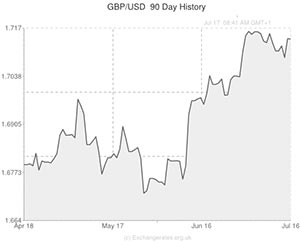
The Pound remained well bid versus the majors yesterday as a mixed bag of British labour market data hit the newswires.
On the one hand Sterling investors were cheered by another drop in the headline unemployment rate; this time from 6.6% to a fresh 5-year low of 6.5%. The encouraging dip in joblessness was accompanied by news that the official employment rate is now at 73.1%, which is the highest level it has reached since records began in 1971.
It was also announced that 929,000 jobs were created during the past 12 months – the fastest jump in over 40 years. And that June’s jobless claims total fell by a very respectable -36,300.
On the other hand holders of the Pound were slightly concerned by the latest wage growth figures, which detailed that average weekly earnings slid from 0.8% to a 5-year low of 0.3%. To make matters worse wage growth minus bonuses slowed from 0.8% to 0.7%, which is the index’s worst level since the survey started back in 2001.
It is thought that the earnings inclusive of bonuses index could improve next month when 2013 bonus payment aberrations will not affect the reading. However, there is very little to be upbeat about in terms of the non-bonus wage index.
With CPI inflation printing at 1.5% in May and wage growth floundering at just 0.7% it is now apparent that real wages weakened by -0.8%. June’s inflation reading jumped higher to 1.9% so it will take a vastly improved wage growth score of 1.1% in June just to maintain negative real wage growth of -0.8%.
This soft outlook for earnings has the potential to deter the Bank of England from hiking interest rates at this juncture. After all a tightening of lending conditions at a time when consumers’ ability to spend is already being strangled by rising prices and stagnant pay growth does not look to be a wise decision.
However, BoE Governor Mark Carney has repeatedly stated in recent weeks that the overheating housing market is the biggest threat to financial stability in Britain and it does not look like the epidemic of rapidly rising house prices is going to abate without decisive action. For this reason it is looking increasingly likely that the BoE will attempt to rein in lending by hiking interest rates either in Q4 of 2014 or Q1 of 2015.
This is the reason that Sterling is currently trading close to monthly highs versus the commodity currencies (Canadian Dollar, Australian Dollar and New Zealand Dollar) and multi-year highs versus its most-traded currency peers (the Euro and the US Dollar).
As long as housing market indicators continue to signal that the sector is overheating then it is likely that demand will also remain red-hot for the Pound Sterling.
UPDATED 10:10 GMT 18 July, 2014
Pound to US Dollar Up Slightly as Risk Aversion Fades
A risk-off environment was triggered by yesterday’s tragic news regarding the downing of a Malaysian aircraft.
However, after investors initially flocked to safe-haven assets like the US Dollar (to the detriment of currency’s like the Pound) the situation calmed and Sterling was able to recoup its modest losses.
The GBP/USD pairing is currently trending in the region of 1.7111.

Comments are closed.